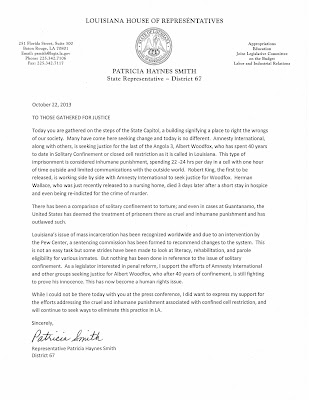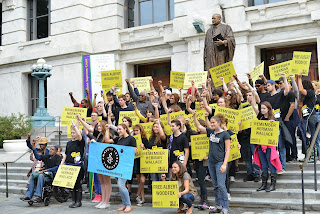Please sign the Amnesty International petition to release Albert Woodfox here!
 |
| (FLYER: Join Amnesty and the A3 Coalition on Oct. 19 in New Orleans and Oct. 21 at the Capitol in Baton Rouge) |
|
Amnesty International has launched a new campaign demanding Albert Woodfox’s immediate release from prison (featured below), declaring that “Herman died a free man. Let’s help Albert live as one.” Indeed, it is now its up to us to continue Herman Wallace’s fight for justice. We must do everything we can to have Albert released from prison as soon as possible.
The widespread media coverage documenting Herman’s struggle for release during his final months has exposed the horror of ‘Louisiana Justice’ for anyone who is willing to look. Consequently, the world is disgusted by the inhumanity and repression endured by the Angola 3.
Last week, the United Nations Special Rapporteur on torture, Juan E. Méndez, called for Albert’s immediate release from solitary confinement. “Keeping Albert Woodfox in solitary confinement for more than four decades clearly amounts to torture and it should be lifted immediately,” said Mr. Méndez. “I am deeply concerned about his physical and mental condition.” Read the full UN statement here.
We are inspired by Herman’s release, yet outraged that it took so long. Today, we firmly believe that the momentum created by Herman’s struggle, the recent UN statement for Albert, and now the Amnesty campaign, is the final push we need to make Albert’s freedom a reality. This is our best chance ever for Albert’s release and the time for action is now. Please join us in Louisiana for events on Saturday, October 19 and Monday, October 21. More information about the events and campaign to free Albert are featured below.
Please sign the Amnesty International petition to release Albert Woodfox here!
“Enough is Enough!” Join Us and Demand Albert Woodfox’s Immediate Release
Amnesty International’s campaign is calling on James Caldwell, Attorney General of Louisiana, Bobby Jindal, Governor of Louisiana, James M. LeBlanc, Secretary of the Department of Public Safety, and Jocelyn Samuels, Acting Assistant Attorney General, to release Albert from prison. The email action and a separate press release are both reprinted below, in full.
As part of their campaign, Amnesty International is organizing two upcoming events in Louisiana with Angola 3 supporters.
On Saturday, Oct. 19, there will be a second line parade in honor of Herman in New Orleans, at 2:00 pm, starting at St. Augustine Catholic Church, 1210 Governor Nicholls Street, and concluding at the Louisiana Supreme Court, 400 Royal Street. Bring your banners, wear your t-shirts and join the parade for Herman!
On Monday, Oct. 21, there will be a media conference at the State Capitol in Baton Rouge with congressional champions and Angola 3 advocates who will hand deliver tens of thousands of signatures calling for Albert’s release. Amnesty and supporters will gather at 12:00 noon on the steps of the Capitol, 322 State Capitol Drive. For transportation from New Orleans, a bus will leave from St. Augustine Catholic Church, 1210 Governor Nicholls St. at 9:45 am. Join us for this important event.
Later, on the evening of the 21st, at 8:00 pm, A3 supporter Jackie Sumell, of Herman’s House, will be speaking at Tulane University (Kendall Cram, LBC). See the event flyer here.
Herman died a free man. Let’s help Albert live as one.
Herman Wallace died nine days before his 72nd birthday. The famed ‘Angola 3′ prisoner succumbed to liver cancer on Friday, 3 days after being released from prison.
Herman survived more than 41 years of isolation, becoming a fierce activist calling for an end to the cruel, inhuman use of solitary confinement.
He died a free man, but the search for justice is far from over. The third member of the Angola 3, Albert Woodfox, is STILL being held in solitary confinement.
Enough is enough — call on Louisiana authorities to free Albert Woodfox.
Albert was placed in solitary after a 1972 murder that he maintains he did not commit. There is no physical evidence linking him to the crime.
Albert’s conviction has already been overturned three times — most recently by a federal district court — but the state obsessively appeals every time the court rules in his favor.
Tell the Louisiana authorities to free Albert Woodfox today.
Before he died, Herman said this about Albert and their struggle for human rights:
“I want the world to know that I am an innocent man and that Albert Woodfox is innocent as well…The state may have stolen my life, but my spirit will continue to struggle along with Albert and the many comrades that have joined us along the way here in the belly of the beast.”
I never met Herman, and yet I will always remember him as larger-than-life — a symbol of resistance to human rights abuses and injustice who refused to be silenced. More than 110,000 people like you rose up to free him — Now it’s time to shine the light for Albert — take action.
In solidarity,
Jasmine Heiss
Campaigner, Individuals and Communities at Risk
Amnesty International USA
(End of email alert. The Oct. 10 Amnesty USA press release begins.)
 |
| (PHOTO: Louisiana State Capitol, April 17, 2012) |
Louisiana Must End Campaign of ‘Vengeance’ Against Remaining Angola 3 Prisoner Albert Woodfox
Contact: Suzanne Trimel, strimel@aiusa.org, 212-633-4150, @AIUSAmedia
(NEW YORK) – Following the death of Herman Wallace, who was held in solitary confinement for nearly 40 years, Amnesty International today launches a campaign demanding the release of his co-defendant Albert Woodfox, who also has been held in cruel conditions of isolation following a deeply flawed trial.
‘Enough is enough,’ said Steven W. Hawkins, Amnesty International USA executive director. ‘Nothing can justify the cruel treatment that the state of Louisiana has inflicted on Albert Woodfox. It’s simply unconscionable for the state to hold him one day longer. His trial was flawed and his conviction has been overturned three separate times. Authorities must let the most recent court ruling stand and release Woodfox from prison. At this point, Louisiana officials seem to be out for vengeance; instead, we call on them to act in the interest of justice and see that he is released.’
Woodfox and Wallace were both convicted of the 1972 murder of prison guard Brent Miller. There was no physical evidence to link them to the crime and their convictions relied primarily on the dubious testimony of a sole eyewitness who received favorable treatment in return for his testimony.
Both men have robustly denied any involvement in the crime. They believe they were falsely implicated in the murder because of their political activism in prison as members of the Black Panther Party.
Earlier this year a federal judge overturned the conviction. However, Woodfox continues to languish in prison after the state of Louisiana appealed against his release.
During a legal process that has spanned four decades, Woodfox’s conviction has been overturned three times.
‘Were it not for the state of Louisiana’s dogged determination to appeal against these rulings, Woodfox would almost certainly be a free man by now,’ said Tessa Murphy, an Amnesty campaigner.
Wallace was released last week just days before he died of liver cancer. A federal judge who overturned his conviction said it would hold the state in contempt of court if it attempted to appeal the case.
For most of the last four decades, Woodfox has been confined to a small cell for 23 hours a day, denied access to meaningful human interaction and rehabilitation.
Prison records show that Albert has not committed any serious disciplinary infractions for years and that he doesn’t pose a threat to himself or others.
Take action: Demand the release of Albert Woodfox.
Amnesty International is a Nobel Peace Prize-winning grassroots activist organization with more than 3 million supporters, activists and volunteers in more than 150 countries campaigning for human rights worldwide. The organization investigates and exposes abuses, educates and mobilizes the public, and works to protect people wherever justice, freedom, truth and dignity are denied.









